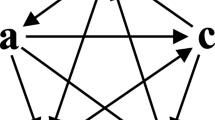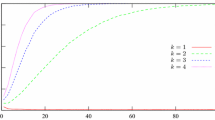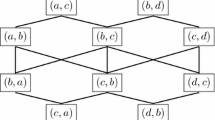Abstract
Tournament solutions provide methods of selecting winners of a competition based on the results of pairwise comparisons. These methods have been studied in-depth from the perspective of social choice theory, where a comparison between two candidates indicates which of them is preferred to another by the majority of voters. In this paper we study the party setting, in which groups of candidates select their representatives. We consider the Uncovered Set tournament solution, in which a candidate i is selected if no other candidate beats all the options defeated by i, and contrast it with the Condorcet Winner rule, in which either Condorcet winner is chosen or no selection is made. We show that checking if a Nash equilibrium exists is NP-complete for both of these rules. Moreover, from the perspective of Uncovered Set, it is also NP-complete to check if a party has a potential winner.
Access this chapter
Tax calculation will be finalised at checkout
Purchases are for personal use only
Similar content being viewed by others
References
Altman, A., Procaccia, A.D., Tennenholtz, M.: Nonmanipulable selections from a tournament. In: IJCAI (2009)
Aziz, H., Brill, M., Fischer, F., Harrenstein, P., Lang, J., Seedig, H.G.: Possible and necessary winners of partial tournaments. J. Artif. Intell. Res. 54, 493–534 (2015)
Aziz, H., Gaspers, S., Mackenzie, S., Mattei, N., Stursberg, P., Walsh, T.: Fixing balanced knockout and double elimination tournaments. Artif. Intell. 262, 1–14 (2018)
Borodin, A., Lev, O., Shah, N., Strangway, T.: Primarily about primaries. In: Proceedings of the 33rd AAAI Conference on Artificial Intelligence, pp. 1804–1811 (2019)
Brandt, F., Brill, M., Harrenstein, B.: Tournament solutions. In: Brandt, F., Conitzer, V., Endriss, U., Lang, J., Procaccia, A.D. (eds.) Handbook of Computational Social Choice, pp. 453–474. Cambridge University Press (2016)
Brandt, F., Geist, C., Harrenstein, P.: A note on the McKelvey uncovered set and pareto optimality. Soc. Choice Welfare 46(1), 81–91 (2016)
Brill, M., Conitzer, V.: Strategic voting and strategic candidacy. In: Twenty-Ninth AAAI Conference on Artificial Intelligence, pp. 819–826 (2015)
Cross, W.: Democratic norms and party candidate selection: taking contextual factors into account. Party Polit. 14(5), 596–619 (2008)
Cross, W., Blais, A.: Who selects the party leader? Party Polit. 18(2), 127–150 (2012)
Dutta, B., Jackson, M.O., Le Breton, M.: Strategic candidacy and voting procedures. Econometrica 69(4), 1013–1037 (2001)
Eraslan, H., McLennan, A.: Strategic candidacy for multivalued voting procedures. J. Econ. Theory 117(1), 29–54 (2004)
Faliszewski, P., Gourvès, L., Lang, J., Lesca, J., Monnot, J.: How hard is it for a party to nominate an election winner? In: IJCAI (2016)
Fishburn, P.C.: Condorcet social choice functions. SIAM J. Appl. Math. 33(3), 469–489 (1977)
Fisher, D., Ryan, J.: Tournament games and positive tournaments. J. Graph Theory 19(2), 217–236 (1995)
Harrenstein, P., Lisowski, G., Sridharan, R., Turrini, P.: A Hotelling-Downs framework for party nominees. In: Twentieth International Conference on Autonomous Agents and Multiagent Systems, pp. 593–601. AAMAS (2021)
Harrenstein, P., Turrini, P.: Computing Nash equilibria for district-based nominations. In: International Conference on Autonomous Agents and Multiagent Systems. AAMAS (2022)
Hazon, N., Dunne, P., Kraus, S., Wooldridge, M.: How to rig elections and competitions. In: Second International Workshop on Computational Social Choice. COMSOC (2008)
Kim, M.P., Suksompong, W., Williams, V.V.: Who can win a single-elimination tournament? SIAM J. Discret. Math. 31(3), 1751–1764 (2017)
Kondratev, A.Y., Mazalov, V.V.: Tournament solutions based on cooperative game theory. Int. J. Game Theory. 49, 1–27 (2019)
Laffond, G., Laslier, J.F., Breton, M.L.: The bipartisan set of a tournament game. Games Econom. Behav. 5, 182–201 (1993)
Laslier, J.F.: Tournament Solutions and Majority Voting. Studies in Economic Theory, vol. 7, 1st Edn. Springer Verlag, Heidelberg (1997). https://springer.longhoe.net/book/9783642645617
Lisowski, G., Ramanujan, M., Turrini, P.: Equilibrium computation for knockout tournaments played by groups. In: International Conference on Autonomous Agents and Multiagent Systems. AAMAS (2022)
Meir, R.: Strategic Voting. Morgan & Claypool, San Rafael (2018)
Miller, N.R.: A new solution set for tournaments and majority voting: further graph- theoretical approaches to the theory of voting. Am. J. Polit. Sci. 24(1), 68–96 (1980)
Moon, J.: Topics on tournaments. Holt, Reinhart and Winston (1968)
Obraztsova, S., Elkind, E., Polukarov, M., Rabinovich, Z.: Strategic candidacy games with lazy candidates. In: Twenty-Fourth International Joint Conference on Artificial Intelligence (2015)
Vassilevska Williams, V.: Fixing a tournament. In: Twenty-Fourth AAAI Conference on Artificial Intelligence, pp. 895–900. AAAI (2010)
Wauters, B.: Explaining participation in intra-party elections: evidence from Belgian political parties. Party Polit. 16(2), 237–259 (2010)
Acknowledgements
I would like to thank Paul Harrenstein and Paolo Turrini, as well as Jȩdrzej Kołodziejski, for their helpful comments.
Author information
Authors and Affiliations
Corresponding author
Editor information
Editors and Affiliations
Rights and permissions
Copyright information
© 2022 The Author(s), under exclusive license to Springer Nature Switzerland AG
About this paper
Cite this paper
Lisowski, G. (2022). Strategic Nominee Selection in Tournament Solutions. In: Baumeister, D., Rothe, J. (eds) Multi-Agent Systems. EUMAS 2022. Lecture Notes in Computer Science(), vol 13442. Springer, Cham. https://doi.org/10.1007/978-3-031-20614-6_14
Download citation
DOI: https://doi.org/10.1007/978-3-031-20614-6_14
Published:
Publisher Name: Springer, Cham
Print ISBN: 978-3-031-20613-9
Online ISBN: 978-3-031-20614-6
eBook Packages: Computer ScienceComputer Science (R0)




